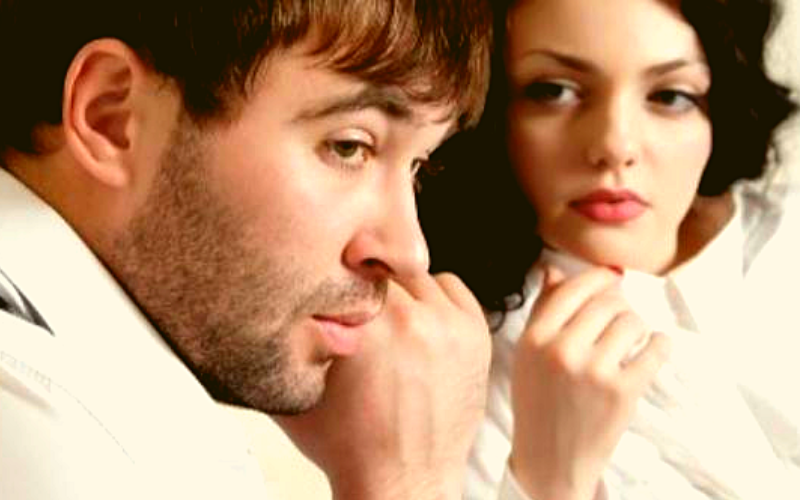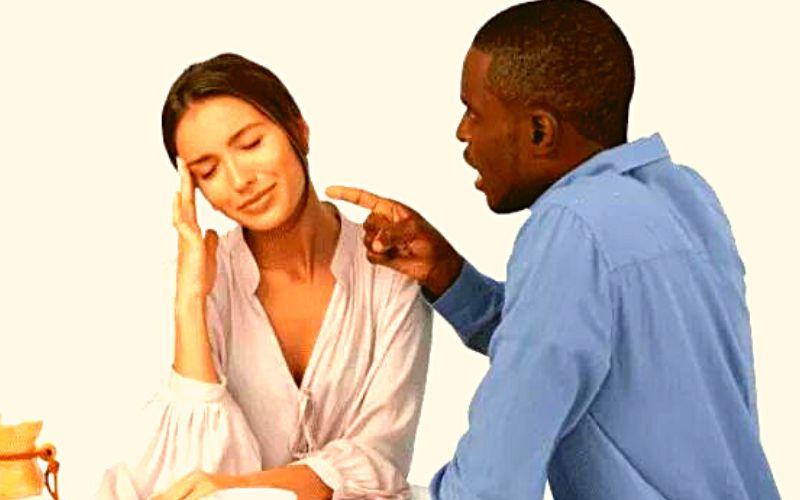When you are in a relationship and suspect your partner is feeling jealous, you can often tell by their body language.
Common signs that he is jealous include making put-downs or sarcastic remarks, snooping through your personal info, or giving you disapproving looks when you speak to someone else.
Another indicator is if he changes the topics of conversation when another attractive person enters the room. He might also move closer to you when there’s an opposite sex around, as though marking his territory. All these tiny signals can help you decipher if your partner is feeling threatened.
Body Language Signs He Is Jealous
The body language of jealousy reveals many different signs that a person is feeling envious. Some examples are avoiding eye contact, pointing his feet away from you, constantly glancing at you and the one he is jealous of, crossing his arms to create a barrier between you and him, increased physical distance, aggressive behavior, and quick changes in mood.
All of these signs indicate that he may be struggling with intense envy over the situation. Knowing how to recognize the body language of jealousy can become a helpful tool in identifying it within others and understanding why it might be present.
When appropriately responded to, it can help to build relationships rather than cause damage to them.

They Avoid Eye Contact
If Someone Is Jealous, They May Find It Difficult To Maintain Eye Contact With The Person Or Situation That Is Triggering Their Jealousy.
If someone is experiencing jealousy, they may find it hard to make and maintain eye contact with the person or situation that has elicited the feeling. Oftentimes, people who are envious will avoid looking directly at the object of their envy for fear of being exposed and having their jealous emotions revealed.
Eye contact can be difficult in these situations because it can cause a range of uncomfortable feelings including shame, fear, guilt, inadequacy, and embarrassment.
When someone avoids eye contact it can signal to those around them that they are distressed or uncomfortable in some way. This behavior can also be interpreted as a sign of disrespect or aloofness that might further fuel feelings of resentment.

They Become Defensive
Jealousy Can Sometimes Manifest As Defensiveness, As The Person May Feel Like They Need To Protect Themselves Or Their Position.
Jealousy can cause a person to become defensive as they may feel insecure, threatened or inadequate in their environment. This defensiveness might manifest in passive-aggressive behaviors, lashing out at the perceived threat, or denying the feeling of jealousy altogether.
They may also become overly protective of their own possessions or place in the world, such as their relationships, job status, material goods or even their position in society.
On a deeper level, this defensive behavior could be an attempt to compensate for feelings of insecurity and fear of rejection that stem from underlying feelings of inadequacy and shame.
By showing defensiveness in response to the perceived threat of jealousy, a person is using avoidance tactics in order to protect themselves from potential emotional harm.
They Try To One-Up You
Someone Who Is Jealous May Feel The Need To Constantly Outdo You Or Prove Themselves To Be Better Than You.
Body language symptoms of jealousy can include crossing the arms, avoiding eye contact, shifting around uncomfortably, scowling or furrowing their brows, and excessive fidgeting.
These physical cues are often supplemented by verbal cues such as sarcastic comments, belittling remarks, or brash attempts to prove themselves superior to you.
They may also go out of their way to make sure that you know that they are doing better than you in certain areas and will boast about their successes.
Someone who is jealous may always be on the defensive when interacting with you, expecting criticism and insults even when none is given.

They Make Negative Comments
Jealousy Can Sometimes Lead People To Make Negative Comments Or Criticism About The Person Or Situation That Is Causing Their Jealousy.
When people feel jealous, it can manifest itself in negative behavior such as making negative comments or criticism.
This type of behavior can be characterized by certain body language cues, such as furtive glances, closed-off postures, crossed arms and legs, and aggressive facial expressions.
A person feeling jealous may also display signs of anxiety or insecurity such as sweating, increased heart rate, or fidgeting, as a result of their jealousy. They may also exhibit defensive behaviors such as deflecting attention away from the source of their jealousy or engaging in sarcastic remarks.
People who are feeling jealous may even become hostile if the situation is not addressed properly. It is important to be aware of these types of behaviors so that those affected can take steps to address the underlying jealousy before it escalates into something more serious.
They Become Overly Competitive
In An Effort To Alleviate Their Jealousy, Someone May Become Excessively Competitive Or Try To Win At All Costs.
In an effort to assuage their underlying feelings of jealousy, someone may become overly competitive or attempt to win at all costs. This can manifest itself in a number of ways, including shifts in body language.
For instance, they may appear tense and uneasy, with physical cues such as crossed arms or furrowed brows indicating discomfort or agitation.
They may seem overly eager to prove themselves or compete with those around them, instead of simply showing enthusiasm for whatever activity is being performed, by boasting about their abilities or trying to outdo others.
They may also pay close attention to the success of others and make disparaging remarks about it. Such behaviors are a sign of deep-seated insecurity and can result in negative outcomes if left unchecked.

They Become Possessive
If Someone Is Feeling Jealous, They May Become Overly Possessive Of The Person Or Thing That They Are Jealous Of.
If someone is feeling jealous, they may become overly possessive of the person or thing that they are jealous of.
This could manifest itself in many ways, such as the individual constantly wanting to be involved in the other person’s activities, not wanting them to spend time with anyone else, monitoring their whereabouts, or becoming very protective of the object or person.
Someone who is jealous may exhibit signs of frustration through clenched jaws and fists, rolling eyes, crossed arms and legs, and decreased eye contact. They might also display increased levels of possessive behavior through excessive touching or leaning into the other person.
In extreme cases, this possessiveness may even lead to verbal outbursts or physical aggression as a way to control the situation and/or establish dominance.
They Withdraw
Jealousy Can Sometimes Cause People To Withdraw From The Situation Or The Person That Is Causing Their Jealousy.
When someone is feeling jealous, their body language may change in subtle ways. For example, they may often cross their arms over their chest and appear closed off from the conversation or situation. They might also avoid eye contact with the other person and shift their gaze away.
Their facial expression may appear to be more guarded, with less smiling or laughing than usual. They might start talking less and showing a lack of interest in the conversation at hand.
All of these behaviors are a sign that the person may be feeling jealous and uncomfortable with the situation.
They Exhibit Nervous behavior
Jealousy Can Be A Stressful Emotion, And Someone Who Is Experiencing It May Exhibit Nervous Behavior Such As Fidgeting, Sweating, Or Shaking.
Someone who is experiencing jealousy may display certain body language signals that could indicate their emotional state. These may include avoiding eye contact, tensing of the jaw, furrowing of the brow, rigid posture or crossed arms, clenched fists, and rapid breathing.
Other signs to look out for are fidgeting with objects such as pens or coins, sweating or trembling when talking about the subject that is causing discomfort, and being overly defensive or aggressive towards others in discussions.
It is important to remember that these behaviors can be indicative of a range of emotions beyond jealousy so it is important to pay attention to other contextual clues when trying to identify what your partner might be feeling.

They Exhibit Aggressive Behavior
In Extreme Cases, Jealousy Can Lead To Aggressive Behavior, Such As Yelling Or Even Physical Violence.
When one is exhibiting signs of jealousy, it is often apparent in their body language. A person may stand or sit rigidly, with their arms and legs crossed. Their facial expressions may show a hint of anger or even rage; the eyes can be narrowed and eyebrows furrowed.
They may have clenched fists and teeth, and their voices can become louder and more aggressive as they communicate. They could also fidget more than usual, tapping their fingers or pacing the room.
In extreme cases, where jealousy leads to aggression such as yelling or physical violence, there can be verbal cues that precede the outburst such as raised voices, name-calling, and insults.
Other signs include intimidating posturing or gestures like pointing and making menacing faces. All these behaviors are indicative of a jealous attitude and should not be taken lightly.
They Mimic Your Behavior
If Someone Is Jealous, They May Unconsciously Mimic Your Body Language Or Behavior As A Way Of Trying To Establish A Closer Connection Or Feel More In Control Of The Situation.
What Are Some Common Body Language Signs That Indicate Jealousy In Men?
Some common signs of jealousy in men include tense facial expressions, clenched fists or jaw, crossed arms, raised eyebrows, or a stiff and rigid posture.
Can A Man Hide His Jealousy Through Body Language?
Yes, a man can hide his jealousy through body language. He may appear calm and composed, avoid eye contact or may even smile to mask his true feelings.
How Can You Tell If A Man Is Jealous Of Another Man?
Signs that a man is jealous of another man may include him constantly trying to one-up the other man, being critical of his achievements, and showing negative body language such as avoiding him or crossing his arms when he is around.
Are There Any Non-Verbal Cues That Indicate A Man Is Jealous Of His Partner?
Yes, a man who is jealous of his partner may exhibit possessive behavior such as constant monitoring of her activities, checking her phone, and showing negative body language such as tensing up or clenching his fists when she interacts with other men.
Can Jealousy Be A Positive Thing In A Relationship?
While some degree of jealousy is normal in a relationship, excessive jealousy can be toxic and damaging. It can lead to controlling behavior, mistrust, and even abuse. It is important for partners to communicate openly and address any feelings of jealousy healthily and constructively.
What Should You Do If You Suspect Your Partner Is Jealous?
It is important to approach the situation with empathy and understanding. Start by talking to your partner and asking them what is causing their jealousy.
Listen to their concerns and try to address them in a respectful manner. If the jealousy is excessive or causing harm, it may be necessary to seek professional help.
Is Jealousy Always A Sign Of Insecurity?
Not necessarily. While jealousy can be a sign of insecurity, it can also be a normal human emotion that arises in response to certain situations. If jealousy is excessive or causing harm, it may be a sign of underlying insecurities that need to be addressed.
Can Jealousy Be A Sign Of Love?
While jealousy may be seen as a sign of love in some cultures, it is not a healthy expression of love. True love is built on trust, respect, and mutual support, not on possessiveness or control.
What Are Some Tips For Managing Jealousy In A Relationship?
Communicate openly and honestly with your partner, practice empathy and understanding, work on building trust, avoid comparisons, focus on your own self-improvement, and seek professional help if necessary.
Can Jealousy Ever Be A Good Thing In A Relationship?
While jealousy is generally viewed as a negative emotion, in some cases, it can be a sign that a partner values and cares for the relationship. It is important to distinguish between healthy and unhealthy jealousy and to address any negative behaviors that may arise from excessive jealousy.
In conclusion, being able to read body language signs can provide important insights into a person’s emotional state, including jealousy. When it comes to identifying jealousy in someone’s body language, there are several key indicators to look out for, such as increased tension, negative facial expressions, and changes in body position.
It’s important to remember, however, that body language signs are not always clear-cut and can vary depending on the individual, the situation, and the cultural context. It’s important to use these signals in conjunction with other forms of communication to gain a more complete understanding of someone’s emotions and intentions.

Hi, I’m Jasmine Sophie and welcome to my website!
As a marriage counsellor, I’m passionate about helping people figure out solutions to their relationship issues. While based in Austin and with most of my clients coming from the local area, I believed that there were more people out there who could benefit from my services.
That’s why I decided to set up this webiste; so that I can help even more people break through any difficulties they may be facing in their relationships. In my free time, I enjoy activities like golfing and fishing, as well as just spending time with family. It’s just another way for me to explore my creativity and use it towards helping others.
Experience:
With a wealth of experience in the realm of love and relationships, Jasmine has been transforming lives for over a decade. Her remarkable journey as a licensed psychologist and marriage and couples therapist has allowed her to witness the transformative power of love firsthand. Through her extensive work with diverse couples, she has unraveled the secrets to fostering healthy and thriving partnerships.
Expertise:
Jasmine’s expertise lies in untangling the complex web of relationship dynamics. Whether it’s reigniting the spark in long-term marriages, healing wounds from past relationships, or guiding individuals in their pursuit of true love, Jasmine possesses an unwavering commitment to helping people create fulfilling and joyful connections. Her profound insights and practical strategies have earned her accolades as a trusted authority in the love and relationship sphere.
Education:
Jasmine Sophie’s academic achievements serve as a solid foundation for her exceptional knowledge in the field. She holds a master’s degree in Psychology, specializing in marriage and family therapy. Combining her academic prowess with her empathetic nature, Jasmine seamlessly integrates evidence-based techniques and profound wisdom to empower her readers to navigate the complexities of modern relationships with grace and authenticity.
Join Jasmine Sophie on joypassiondesire.com, and embark on a transformative journey to embrace love, ignite passion, and cultivate relationships that transcend ordinary boundaries. Through her illuminating articles and expert guidance, she will empower you to create a love story that is worthy of celebration and admiration. Get ready to embark on an extraordinary adventure of love and self-discovery with Jasmine Sophie as your trusted guide.